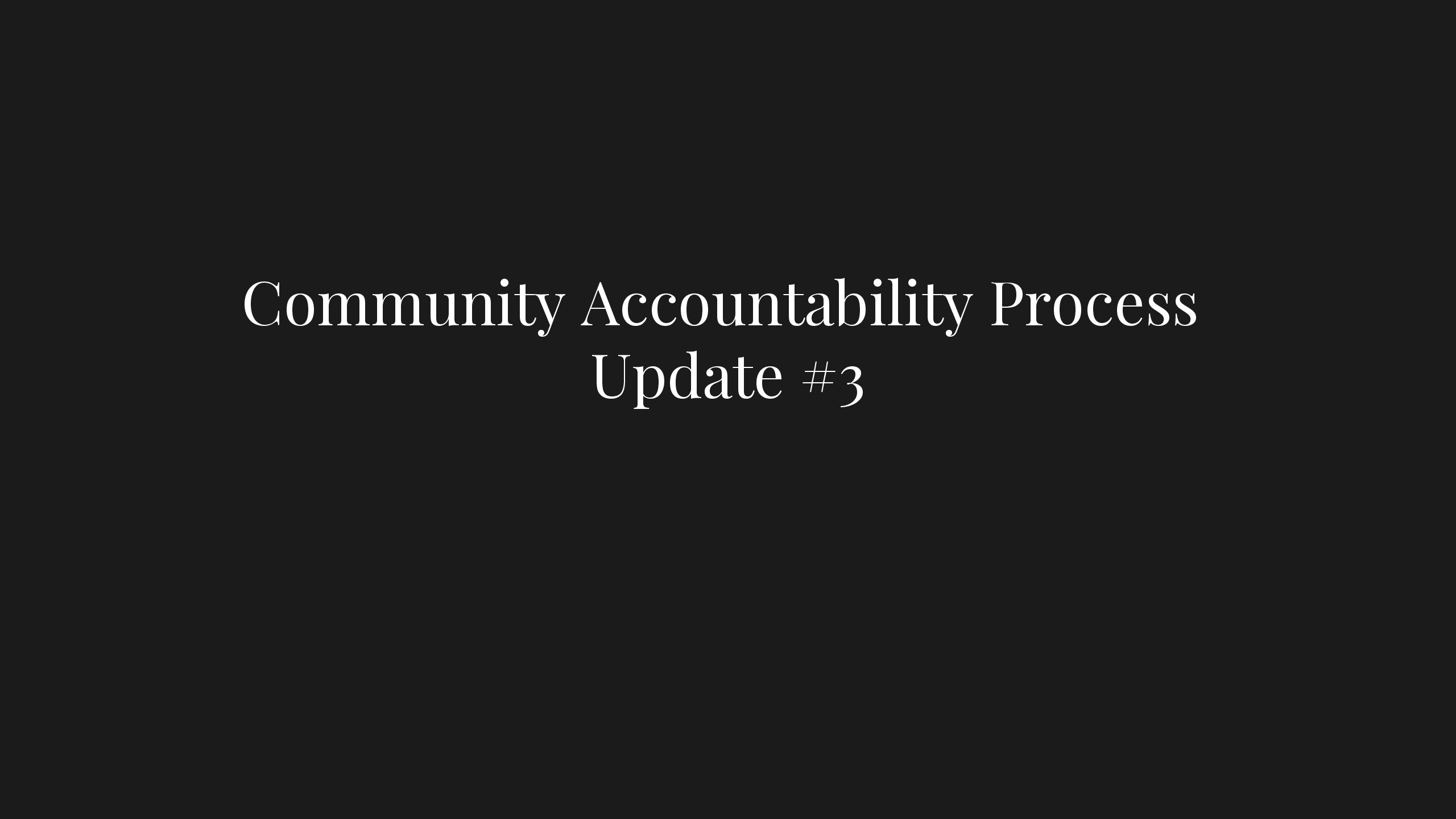Free Write Community Accountability Process Update #3
Accountability: Why Now?
Published February 17, 2021
Edited February 26, 2021 to remove some details that were exacerbating harm in the community.
When Free Write shared our Community Accountability statement at the end of 2020, we also sent it directly to all of our funders, board members, systems partners, and newsletter subscribers. Our community read, processed, and reached out to have conversations with us about the events leading up to the statement and the nature of the harm Free Write caused. In those conversations, a question nearly everyone asked was “Why are you doing this now?” It’s a question that deserves particular attention, especially when asked alongside another question posed by our process facilitator McKensie Mack, “Why not before?” Why had we maintained a relationship with someone we know caused harm? Why had we not taken accountability sooner? We are following up here with answers to these questions.
Why Not Then?
In April 2014, Free Write leadership learned of allegations of harm caused by Roger Bonair-Agard within another youth-serving organization where he was employed. In light of this information, we assessed the safety of our students as they interacted with Roger in our classroom inside the CCJDC. Free Write considered Roger’s experience working successfully with incarcerated people important, as it was a rare and critical experience. As we considered the safety of our students, our thinking was that the classroom is supervised by county staff at all times during workshops with small groups of male students and would therefore be safe. We had watched Roger build solid creative communities with his incarcerated students. We spoke with Roger about it directly and he expressed that he was not even sure who was making the “allegations” which, in hindsight, was a red flag for the way he would repeatedly deflect from being accountable for the harm he caused. We chose to keep Roger on as a teaching artist until we knew more about the situation and received direction from the survivor about what accountability should look like.
In 2016 and into 2017, Free Write staff began to map personal and organizational strategies for addressing the harm caused by a member of our staff. We began to devise internal strategies to address harm caused by Roger in 2014 as well as any future instances of harm that may be caused by any Free Write staff member. These strategies also were a way for Free Write to begin to show to community partners, some of whom refused to work with us or required that Roger not be a part of our collaboration, that we were working towards some sort of accountability and repairing of harm. As our understanding of community accountability practices was deepening and our approach to abolition through liberatory education was becoming more clear, we began to craft internal policies that sought to offer space for individuals to take accountability when necessary while, as an organization, addressing and repairing any harm caused. We looked to our pedagogy, the relationships we had built with our incarcerated students over fifteen years, and the artistic spirit that underlies all of our work. We began a document of principles and policy entitled “Transformative Justice: Addressing Harm Through an Abolitionist Framework.” The document cited our commitment to dismantling rape and prison culture with an understanding that both arise from heteropatriarchal capitalist greed. We wrote about how to address and repair harm, build and maintain space for accountability, and how no individual is disposable. We revisited these thoughts as a staff a couple of times, with the last edit to the document timestamped in late 2017.
These steps were never made public. We sat on them and really did not refer to them again after they were written. We did copy and paste them into our employee handbook so that we could call it “policy” but we never activated them on any tangible level. To do so would have required us to hold ourselves publicly accountable, showing how and why it is OK for us to be working with Roger. It also would have required Roger to take public accountability, which we never demanded. We stopped short of real accountability and the toxicity of the organizational culture intensified over the next few years.
Why Now?
In 2020, beginning in the spring and culminating in October, a series of events led to ending Roger’s employment with Free Write and taking public accountability for our toxic organizational culture and the direct harm that our choices to protect Roger caused to staff members and the community at large.
Roger invited an individual with a long and well-documented history of sexual violence, Malcolm London, to work with Free Write as a teaching artist. When asked by Executive Director Ryan Keesling to please explain, in writing, why he thought it was OK to bring another known abuser into Free Write spaces, he did not respond with any critical thought as to how a working relationship with Malcolm might affect our students, staff, and community partners. He proceeded with hiring Malcolm without the knowledge or approval of Free Write leadership or the board. Though that relationship ended as soon as we became aware of it, the effects that choice may have had on our staff and community partners would have been devastating, particularly as we partnered with individuals and groups that survived the harm caused by this Malcolm. It was at this moment that we began to question Roger’s discretion, awareness, and understanding of his own accountability as an abuser. A guiding question as we take accountability now is this: How did the environment within Free Write become conducive to Roger thinking it was a safe space for anyone with a history of sexual violence? We did have many conversations on how no person is disposable and everyone is worthy of positive development because of/in spite of the harm they have experienced or caused. Those are core to how we interact with our criminalized students, all of whom have been harmed and many of whom have caused harm. How does that thinking extend to our staff? What boundaries should we have with adult staff that we would not have with adolescent students?
Free Write’s choice to maintain a relationship with Roger, a known abuser, elevating him to a position of leadership, while offering no public explanation of any work done toward accountability or repair created a toxic organizational culture for multiple Free Write staff members, including a teaching artist, a coordinator of the Sound & Vision program, and a long-time independent contractor. They resigned or refused to share space with Roger, citing the toxic organizational culture created by his presence. Additionally, a potential funder who is also a long-time community partner informed us that they were withholding financial support for Free Write programming because they saw that Roger was in a position of leadership with the organization, yet there was no public accountability statement from Free Write or from Roger. These instances are described in more detail in the Community Accountability statement.
Subsequently, we became aware of a poem on Roger’s blog, published in April 2010, that details a rape he committed, and hints at others committed over decades. This poem sat on Roger’s website throughout the incident of the harm he caused at the other organization in 2014 and his entire tenure with Free Write. The fact that the poem went unnoticed by Free Write for 10 years indicates the lack of attention given to accountability by Free Write leadership up until now. It also made Roger’s dangerous attitude toward sexual violence, survivors, and his own accountability undeniable. This poem opened Free Write’s eyes to the organization’s role in protecting an abuser as well as the need to step into accountability for our actions.
In October 2020, we finally began to understand that, for six and a half years, we had been making excuses for an abuser at the expense of our staff and community partners. We saw clearly how we had been perpetuating and institutionalizing the harm he had caused while skirting public accountability for that harm. We undertook the task of auditing and articulating our thinking, the essence of which is presented here in this document. We also began a relationship with our facilitator, McKensie Mack, and began to shape what accountability will look like for Free Write moving forward. Since the release of the initial public accountability statement at the end of 2020, we’ve updated our Community Accountability page with action we have taken and action we will soon take, engaged a group of accountability partners who will offer guidance toward full accountability, and committed to monthly updates on our website, social media, and mailing list.


